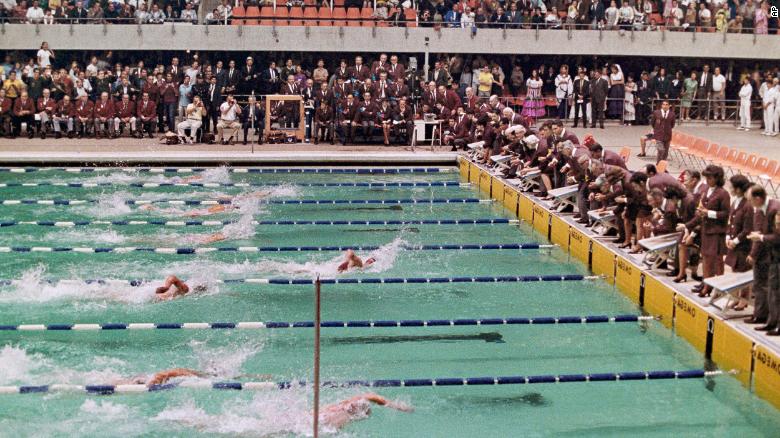Tokyo 2020 athlete beds are company-free 1:05
(CNN) -
Mark Spitz, a nine-time gold medalist, knows a thing or two about successfully navigating the Olympics as an athlete - Spitz, now 71, held the record for seven gold medals in oneself Games when he prevailed in the Munich pool in 1972, a figure that was surpassed by Michael Phelps in 2008.
That was after Spitz aspired to win six golds at the 1968 Mexico City Games, and only got two, both in relays, a disappointment that he said motivated him to achieve his feat of breaking record four. years later.
Here, the former United States swimmer outlines the lessons he learned throughout his Olympic career.
Spitz (center) celebrates gold in the relay at the 1972 Munich Olympics.
1. Be Prepared, Motivated, and Get Lucky
Many people who go to the Olympics have trained their entire lives to do so.
I once calculated that during the 13 or 14 years of my career until I reached Munich, I had swum about 42,000 kilometers, enough to go around the equator, the entire planet.
But so did 200,000 other athletes who were swimmers at the time.
So what distinguished me?
Maybe it was a bit of luck.
Maybe it was the show he was on.
Perhaps it was my "failure" in 1968 that motivated me to do better.
Australian Michael Wenden swims to victory in the 100-meter freestyle at the 1968 Olympics in Mexico City.
Spitz, in lane seven, finished third.
2. Life in the Olympic Village
I think the village is fantastic, but a lot of the great athletes don't even stay there.
After competing, they may return to the village ... once they have secured the gold medal.
advertising
The interior of the 2020 Tokyo Olympic Village 2:14
3. Beware of distractions
In the Olympic village there is a great atmosphere, good for making friends.
But everyone is there to meet a goal.
Sometimes I had the feeling that the villa was not for me, it could be very distracting.
This was certainly the case in 1968, when the swimming trials were held in the second week.
I was young and I lost some of my concentration, I got involved in the exchange of badges and all the other things.
However, it is different now.
Athletes train to be vigilant, regardless of when their competition is.
Spitz competes in butterfly swimming at the 1972 Summer Olympics.
4. If at first you are not successful ...
I often think of Doug Russell in 1968. He swam slower than my world record in the 100-meter butterfly, but still won gold;
I only got the money.
But his victory meant he had to swim in the medley relay, not me.
So my silver potentially cost me two gold.
In my last test, the 200-meter butterfly, I could have been two seconds slower than my personal best and won the gold, but I was eight seconds slower and finished last.
The 200m butterfly was my first race in Munich and I made sure that didn't happen again.
They called me a failure and that affected me.
So a bad experience can inspire someone to be very successful. "
Spitz competes in the 1982 World Swimming Championships.
5. A little distraction doesn't hurt ...
My Russian rivals in Munich had never seen me swim in person and were kind enough to give me a lane during one of their training sessions.
I knew they were taking pictures of me, so I started doing a stupid stroke that had nothing to do with it.
They asked me if I always swam like this and I said "yes".
Then they asked me if my mustache was holding me back.
I was planning to shave it that night, but realized that it actually diverted the water from my mouth and could lower my face a lot and streamline my body.
It probably slowed me a few hundredths of a second, but I was winning by the second, so it didn't matter.
Anyway, after that, I decided to keep the mustache and it ended up being an interesting brand.
Spitz receives his gold medal in the 200 meter butterfly in Munich.
6. Be realistic
About 10,000 athletes attend the Summer Games, and there are about 250 events.
If all team sports are included, about 1,000 medals will be awarded.
That means that only 10% of the athletes who compete are going to be "successful."
United States expected to top Tokyo Olympics medal list
For many, just getting to the Games is an achievement, but in reality only 15% are hunting for medals.
There will be many disappointments.
7. If you get on the podium, take advantage of the moment ...
Take it all in because it won't happen again;
At no other time in your life are you going to get on a podium like that and they are not going to play your national anthem.
Later on, your success will not be measured in the same way, because there will always be someone who will get a better deal, a bigger contract, a bigger acquisition with more money.
Argentine athletes to watch in Tokyo 2020 4:10
So if you are lucky enough to be one of those people, it will be just for a moment and then everyone else will move on.
You have to learn to live with it.
Tokyo 2020








